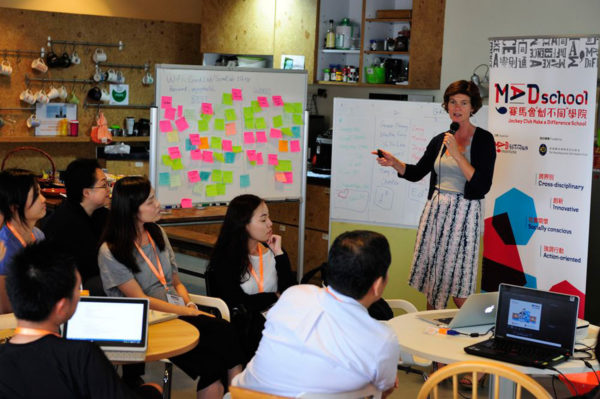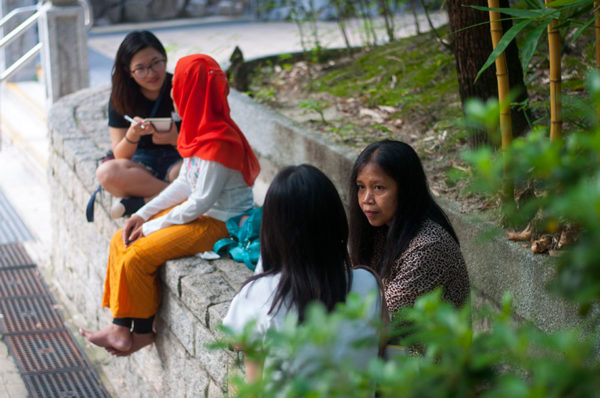KL inspires Hong Kong
Innovative projects were developed in Hong Kong based on our education projects. For Kennisland this is a unique opportunity to further develop our approaches and to see how they work in a different context.
- Contact
- Monique Spijkers ms@kl.nl

Participants of The Dream School in Hong Kong.
Maker: MaD Institute
Rights: All rights reserved
Kennisland’s project Education Pioneers (Onderwijs Pioniers) forms the basis of the Fellowship Program for Teachers, funded by the Jockey Club++Jockey ClubThe Hong Kong Jockey Club is Hong Kong’s most important fund for social initiatives. with the aim of creating more space for the innovative capacity of teachers. Before the covid pandemic, new school concepts were crowdsourced during a summer school++Summer schoolRead more about this summer school. inspired by Our New School (Onze Nieuwe School)++Our New SchoolRead more about crowdsourcing new schools in our case ‘Start-ups in education’., and earlier the Make a Difference School was launched with a social lab that aimed to find new uses for Hong Kong’s libraries++LibrariesRead more about this social lab..
These projects were developed and set up with Kennisland’s help. We organised a social lab sprint in 2015 (see video below), a team came from Hong Kong to Amsterdam to learn about the social lab method and Chris Sigaloff flew to Hong Kong++Summer Dream SchoolRead more about the Summer Dream School. several times to advise governmentsAn explanation for the “import” of projects developed by Kennisland is the growing desire in Hong Kong for innovative approaches that facilitate bottom-up innovation. Hong Kong has little experience with these. and funders.
Why this interest from Hong Kong?
Projects that are developed by Kennisland match with the growing need for innovative approaches that facilitate bottom-up innovation that lives in Hong Kong. Many social innovation approaches are new to Hong Kong. With a more hierarchical social structure, people generally look to the local government to tackle problems, while individual citizens and professionals are mainly seen as consumers. In recent years, grassroots initiatives in Hong Kong have gained more attention and attraction, people are increasingly taking matters into their own handsIn recent years, grassroots initiatives in Hong Kong have gained more attention and attraction, people are increasingly taking matters into their own hands. and feel co-responsible for the development of society. The Umbrella Revolution++Umbrella RevolutionRead more about these sit-in protests. in 2014 and the student protests in 2019-2020 exemplify this movement – and people are seeking for inspiration abroad.
The current political climate in Hong Kong unfortunately shows a tendency away from – rather than towards – grassroots movements. For educators this means that more standardised education protocols and teaching materials are introduced, which makes it challenging to make a class or course ‘your own’ as a teaching professional. A new course “Citizenship and Social Development” will come to replace the “Life and Society” curriculum in the coming school year (2023-2024). The new course material shows a strong top-down view on the subject, where there is little space for discussion or a multitude of perspectives.

Cultural differences
With this transnational exchange the question rises whether the approaches developed in the Netherlands will work within the Hong Kong context and culture. For example, the verbal, direct and opinionated Dutch teachers contrast greatly with the modest, generally quite obedient teachers in Hong Kong. Experimenting, innovating and giving (critical) feedback are less common in Hong Kong as modes of working and interacting. Hong Kong teachers are more hesitant than their Dutch counterparts when it comes to sharing their opinion after having attended a lecture and tend to follow assignments rather than develop their own initiatives. Methods such as Education Pioneers and social labs, where hierarchical differences are put aside, are therefore quite a contrast to the hierarchical and bureaucratic way of working and organising that is common in Hong Kong.
Nevertheless, there is a great deal of interest in these approaches. This is because there is real desire in Hong Kong for ways of working that make it possible for people to take the initiative themselves rather than waiting for the government. People are willing to take action themselves and to make a difference. The success of Education PioneersThe success of Education Pioneers, Our New School and social labs show it is possible to think big but start small., Our New School and the social labs show it is possible to think big but start small, that many small parts eventually make a real difference and that bottom-up innovation can work. The feedback we receive is that the Dutch examples inspire people in Hong Kong and give them confidence. It gives them the helping hand they need to do it themselves.

Exporting or transferring
A recurring theme in the world of social innovation is the need to scale up innovations in order to have a real impact. Too many social innovations are confronted with the limitations of operating in the margins. However, there is also a fundamental unease about scaling up as most social innovations are in fact very specific to a particular context and location. Simply “exporting” methods or solutions therefore does not seem very promising. Our partnership with Hong Kong demonstrates that there is an alternative: not simply scaling up, but making principles that work transferrable.There is a fundamental unease about scaling up as most social innovations are in fact very specific to a particular context and location. It’s better to make principles that work transferrable. This means we will not simply start up Education Pioneers in Hong Kong. Instead, we try to make the principles of the programme so explicit that people in Hong Kong can set it up for themselves. We share our knowledge, are open about our mistakes and successes, contribute ideas and are active partners. Our goal is that Hong Kong should be able to develop its own approaches and methods – not copied but certainly inspired by Kennisland.
Kennisland learns a lot
For Kennisland this is a unique opportunity to further develop approaches and to see how they work in a different context. We can adjust the elements that were not optimal in the Netherlands, while making it possible for those in Hong Kong to experiment based on real, practically-driven experience. It also makes collaboration with numerous parties in Hong Kong possible, which results in new inspiration and knowledge for new approaches in the future.
27 Jun – 2 Jul 2016 ,All day De Ruijterkade 128, Amsterdam
Social Labs: enabling citizens to co-create and co-design innovations
Read this essay, one in a series on future trends for innovative cities, written by the leading thinkers of the Mayor of Seoul’s Social Innovation Global Advisory Committee. First up: Ada Wong, founder of the Make A Difference initiative and The Good Lab in Hong Kong.

